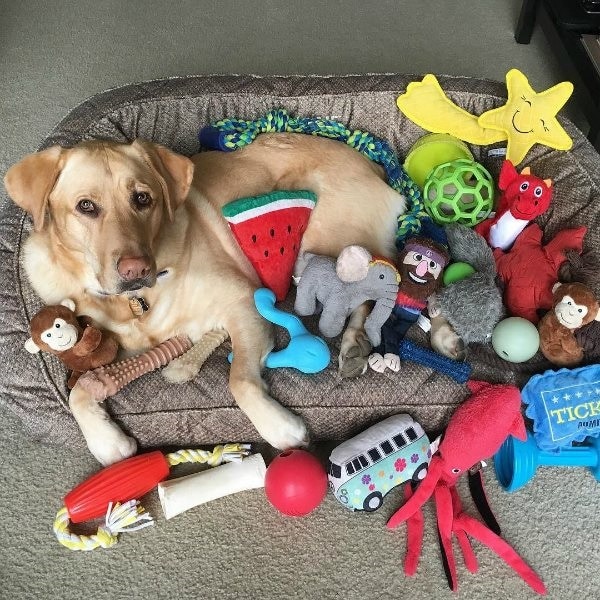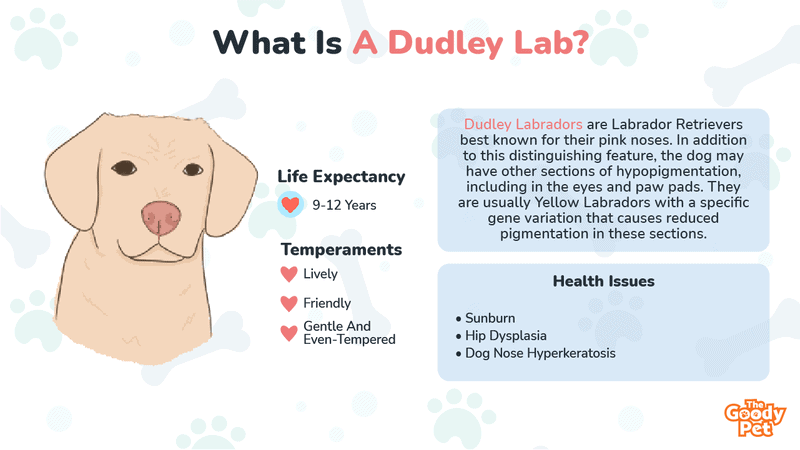Labrador Retrievers are among my favorite dog breeds. There is very little not to love about these dogs, from their looks to their amazing personalities. It is no wonder that they are considered the most popular dog in America and most other parts of the world. I am particularly fond of the rarer aesthetic variations of the Lab breed. The Dudley Labrador is one of these, and in the sections below, you will see why it is such an awesome dog to have.
Dudley Labradors are Labrador Retrievers best known for their pink noses. In addition to this distinguishing feature, the dog may have other sections of hypopigmentation, including in the eyes and paw pads. They are usually Yellow Labradors with a specific gene variation that causes reduced pigmentation in these sections.
Despite their unique and beautiful looks, Dudley Labradors do not always figuratively fly off the shelves. Here is more on why this is the case and everything else you need to know if you are considering one.
What Causes A Dudley Lab?

A Dudley Labrador is a type of Labrador Retriever that has a pink nose.
This variation of the Labrador breed is relatively rare and, unfortunately, plagued by controversy despite its beautiful and mystical aesthetic.
Dudley Labrador Retrievers are considered unacceptable according to AKC breed standards. They are also thought of as less healthy than other Lab variations.
While the pink nose does pose health challenges, Dudley Labs are pretty much like any other Labrador Retriever in every way. Its physical features, in particular, are relatively similar to the standard breed.
Here are the most important of these for some perspective.
Coat Color And Type
More often than not, Dudley Labrador Retrievers have yellow coats. The specific shade of yellow varies based on genetics from pale, cream shades to darker, red varieties.
The fur is short, straight, and densely packed for a beautiful coat.
Size And Build
Dudley Labradors are medium to large dogs weighing between 55 and 80 lbs and measuring 21 to 24 inches in height. They are proportionally built with very muscular limbs and wide chests.
Eyes
The eyes of a Dudley Labrador are oval and wide set on the face. The eye color varies depending on genetics.
In most cases, the hypopigmentation responsible for the pink nose also affects the eyes resulting in light colors like blue. The Dudley Lab may also have yellow, hazel, or brown eyes.
Head Shape And Facial Features
The head shape of a Dudley Lab is like that of any other Labrador Retriever and includes a narrow, long snout and wide cheeks. The ears are also the same distinctly large and floppy type seen with all other Labradors.
Do Dudley Labs Have Health Issues?

Dudley Labs live for anywhere between 9 and 12 years. Some can live for up to 14 years or even more if they are healthy and well taken care of.
The Dudley Labrador Retriever variation suffers from more or less the same conditions that other Labradors do. Furthermore, their hypopigmented parts are exposed to additional and unique health issues.
For some perspective of what you can expect with your dog, here are some of the most common health issues that face the Dudley Lab.
Sunburn
This may come as a surprise to many but dogs actually suffer from skin issues like sunburn. This is more common with hypopigmented variations like the Dudley Labrador.
The noses of these Lab variations may be seriously sunburnt, especially with prolonged exposure to the sun. Sunburns and continued sun exposure put the Dudley Labrador at a higher risk of developing skin cancer lesions later on in life.
Dog Nose Hyperkeratosis
Dudley Labradors are also at risk of developing dog nose hyperkeratosis. This is a condition where skin cells on the dog’s nose produce too much keratin, which forms hard crusts. This may or may not affect the dog’s sense of smell but is generally very uncomfortable for the pooch.
Progressive Retinal Atrophy
Progressive Retinal Atrophy is characterized by slow and irreversible loss of vision on both eyes. Unfortunately, this condition has no cure. However, early discovery allows you to best prepare your Dudley Labrador for their new life through special training.
Hip Dysplasia
Hip dysplasia affects all Labrador Retrievers and the Dudley Lab is no exception. It is associated with the dog’s large size and affects the formation of the hip joint socket.
If management through medication, exercise, and diet modification, is not started promptly, hip dysplasia can easily progress to arthritis.
Is A Pink Nose On A Dog Bad?

Pink noses on dogs have long been considered problematic. This applies both to Dudley Labradors and regular Labs as well as other dog breeds.
For some perspective on what a pink nose could indicate, here are some of the problems associated with the trait in dogs.
Bacterial Infections
Some infections on the nose and in the blood could cause a lightening on the color from black or brown to shades like pink or even white in serious infections. More often than not, these are associated with hyperkeratinization, which results in the formation of crusts.
Contact Dermatitis
These are allergic reactions triggered by contact with materials that the dog may be allergic to. One of the most commonly implicated triggers when it comes to turning the nose pink is plastic. This can be found everywhere, from food bowls to toys. It may also happen with rubber.
Vitiligo And Other Depigmentation Conditions
These conditions affect the formation of melanin on the dog’s skin, including their noses. With conditions like Albinism, the pink nose will be present from birth onwards.
With vitiligo, a Dudley lab may have a dark nose that slowly turns pink.
Autoimmune Disorders
Some of the most commonly implicated autoimmune conditions when it comes to pink noses in dogs include lupus and pemphigus. These are usually associated with other skin issues, including alopecia as well as general, systemic symptoms.
Skin Cancer
Another insidious cause of pink nose in dogs is skin cancer. More often than not, the pink nose spots progress to growths or ulcer lesions. It is therefore best to get any new pink spots checked out by a vet just to be safe.
Do Dudley Labs Bark A Lot? Temperaments Of Dudley Labs

Contrary to what most people believe about Dudley Labradors, they are exactly the same as other Labrador Retrievers. This makes them awesome for use as companions, service dogs, and even hunting dogs.
Here are some of these awesome personality traits that you have to look forward to.
Smart And Eager To Learn
One of the best things about having and living with a Dudley Labrador is the fact that they are very easy to train. They are intelligent, obedient, and very eager to learn.
All you have to do is be consistent with your training and figure out a reward system that works for your pooch and you should be good to go.
Lively
Dudley Labradors are very lively dogs. They are vocal and love to stay active and are therefore ideal if you have young children in the home as they match that same energy.
If you want your Dudley Lab just a little more calm, start discipline and obedience training from an early age and invest in playtime to work out all that extra energy.
Friendly
Dudley Labradors are great if you want a social dog. Like most other dog breeds, they may require some early socialization in order to get comfortable, especially with small pets that they may instinctively want to hunt.
With this early exposure, your Dudley Lab will very easily get along with other pets, including small ones like cats.
Gentle And Even-Tempered
Another reason you may want to consider a Dudley Labrador for a family setting is due to their gentle nature. They can be very protective, especially over young children, and make for the perfect furry siblings.
Do Dudley Labs Shed? Grooming Tips For Dudley Labs
One of the most important aspects of care when raising a Dudley Labrador is good grooming. In the sections below, we shall take a closer look at all the important care tips you need to know, from how to deal with shedding to how to take care of their special needs.
Brush The Dudley Lab’s Coat 3 Times A Week
Dudley Labradors shed moderately to heavily, which is something you will have to stay on top of if you do not want your house turned into a fur dump.
We recommend the FURminator Undercoat Tool, whose bristles are strong enough for the Dudley Lab’s thick coat. The tool’s self-cleaning feature is also something awesome for you to look forward to.
For the rogue fur strands that manage to escape, the iRobot Roomba i3+ will be ready to handle the cleanup. Its automated systems and special pet dander vacuuming feature definitely make it stand out among all the other options.
Schedule A Shower Every 1 To 2 Months
Dudley Labradors sometimes have very sensitive skin. A regular shower with high-quality shampoo does a lot to help deal with this.
We recommend Paws & Pals 6-In-1 Oatmeal Dog Shampoo, which cleans, conditions, eliminates odors, and even relieves itchiness in Dudley Labs with skin irritation.
Invest In Nose And Paw Balms
Hypopigmentation on the nose of the Dudley Lab leaves them vulnerable to issues like sunburn and hyperkeratosis. Investing in a good nose balm for your dog helps you to keep their noses smooth and protected.
Paw balms also go a long way towards preventing issues like cracks and infections.
Related Questions
Will A Puppies Pink Nose Turn Black? Most puppies are born with pink noses, which turn black or dark brown as they grow older. However, this is not always the case, especially with dogs like Dudley Labradors and other breeds and variations with hypopigmentation genes. In these cases, the noses only turn to a slightly darker shade of pink and never black.
Do Metal Bowls Turn Dogs Noses Pink? Metal bowls do not turn dog noses pink. This is more likely to happen with plastic or rubber that causes irritation which could make your dog’s nose appear pink. To avoid this and other reactions associated with the materials, stick to stainless steel or ceramic food and water dog bowls.
Why Is My Dog’s Nose White And Crusty? Your dog’s nose may be turning white and crusty due to a condition known as dog nose hyperkeratosis or even due to infections. These, more often than not, form crusts or flakes that may be black, brown, or white. If the dog’s nose is simply turning white without any crust formation, it is more likely to be a result of vitiligo.





